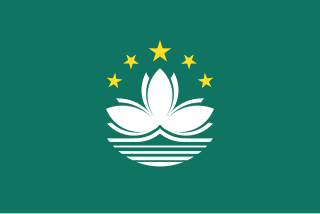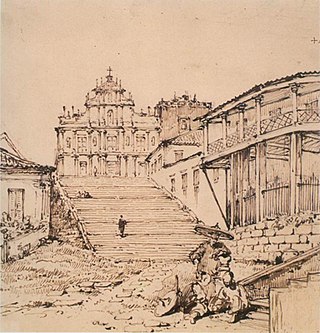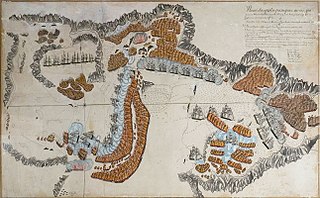
Macau or Macao, officially the Macao Special Administrative Region of the People's Republic of China (MSAR), is a city and special administrative region of China in the western Pearl River Delta by the South China Sea. With a population of about 680,000 and an area of 32.9 km2 (12.7 sq mi), it is the most densely populated region in the world.

Macau is a special administrative region (SAR) of the People's Republic of China. It was leased to Portugal in 1557 as a trading post in exchange for a symbolic annual rent of 500 tael. Despite remaining under Chinese sovereignty and authority, the Portuguese came to consider and administer Macau as a de facto colony. Following the signing of the Treaty of Nanking between China and Britain in 1842, and the signing of treaties between China and foreign powers during the 1860s, establishing the benefit of "the most favoured nation" for them, the Portuguese attempted to conclude a similar treaty in 1862, but the Chinese refused, owing to a misunderstanding over the sovereignty of Macau. In 1887 the Portuguese finally managed to secure an agreement from China that Macau was Portuguese territory. In 1999 it was handed over to China. Macau was the last extant European territory in continental Asia.
Fernão Pires de Andrade was a Portuguese merchant, pharmacist, and diplomat who worked under the explorer and colonial administrator Afonso de Albuquerque. His encounter with Ming China in 1517—after initial contacts by Jorge Álvares and Rafael Perestrello in 1513 and 1516, respectively—marked the resumption of direct European commercial and diplomatic contact with China.

Jorge Álvares was a Portuguese explorer. He is credited as the first European to have reached China by sea during the Age of Discovery. His starting of settlements on an island in what is now Hong Kong is still considered a significant achievement, "for establishing commercial agreements with the Chinese [and for] maintaining the peace".

The Canton System served as a means for Qing China to control trade with the West within its own country by focusing all trade on the southern port of Canton. The protectionist policy arose in 1757 as a response to a perceived political and commercial threat from abroad on the part of successive Chinese emperors.

The Thirteen Factories, also known as the Canton Factories, was a neighbourhood along the Pearl River in southwestern Guangzhou (Canton) in the Qing Empire from c. 1684 to 1856 around modern day Xiguan, in Guangzhou's Liwan District. These warehouses and stores were the principal and sole legal site of most Western trade with China from 1757 to 1842. The factories were destroyed by fire in 1822 by accident, in 1841 amid the First Opium War, and in 1856 at the onset of the Second Opium War. The factories' importance diminished after the opening of the treaty ports and the end of the Canton System under the terms of the 1842 Anglo-Chinese Treaty of Nanking. After the Second Opium War, the factories were not rebuilt at their former site south of Guangzhou's old walled city but moved, first to Henan Island across the Pearl River and then to Shamian Island south of Guangzhou's western suburbs. Their former site is now part of Guangzhou Cultural Park.
Rafael Perestrello was a Portuguese explorer and a cousin of Filipa Moniz Perestrello, the wife of explorer Christopher Columbus. He is best known for landing on the southern shores of mainland China in 1516 and 1517 to trade in Guangzhou, after the Portuguese explorer Jorge Álvares landed on Lintin Island within the Pearl River estuary in May 1513. Rafael also served as a trader and naval ship captain for the Portuguese in Sumatra and Portuguese-conquered Malacca.

The Sino-Portuguese Treaty of Peking was a trade treaty between the Kingdom of Portugal and the Qing dynasty of China, signed on 1 December 1887. It is counted by the Chinese as among the unequal treaties in the aftermath of the Second Opium War. The treaty gave Portugal perpetual colonial rights to Macau on the condition that Portugal would cooperate in efforts to end the smuggling of opium.

China–Portugal relations, can be traced back all the way to 1514 during the Ming dynasty of China. Relations between the modern political entities of the People's Republic of China and the Portuguese Republic officially began on 2 February 1979. China and Portugal established the comprehensive strategic partnership in 2005.
The Battle of Sincouwaan, also known as Battle of Veniaga Island was a naval battle between the Ming dynasty coast guard and a Portuguese fleet led by Martim Afonso de Mello that occurred in 1522. The Ming court threatened to expel Portuguese traders from China after receiving news that the Malacca Sultanate, a Ming tributary, had been invaded by the Portuguese. In addition, the Portuguese had been conducting piracy, acquiring slaves on the Chinese coast to sell in Portuguese Malacca, and preventing other foreigners from trading in China. Portuguese traders were executed in China and a Portuguese embassy was arrested, with their freedom promised on the condition that the Portuguese returned Malacca to its sultan. Martim Afonso de Mello arrived at the Pearl River but was blockaded by a Ming fleet despite his offers of amends. After two weeks without being able to gain a foothold in China they decided to run the blockade and managed to escape with the loss of two ships and several dozen men. The battle was fought off the northwestern coast of Lantau Island, Hong Kong at a location called Sai Tso Wan today.
The Battle of Tunmen or Tamão was a naval battle in which the Ming imperial navy defeated a Portuguese fleet led by Diogo Calvo in 1521.

The Luso-Chinese agreement of 1554 was a trade agreement between the Portuguese headed by Leonel de Sousa, and the authorities of Guangzhou headed by the Provincial Admiral Wang Bo (汪柏), which allowed for the legalization of Portuguese trade in China by paying taxes. It opened a new era in Sino-Portuguese relations, as Portuguese were until then officially barred from trading in the region. In 1517 an embassy led by Fernão Pires de Andrade to the Ming court failed and, after conflicts in 1521 and 1522, trade was conducted as smuggling and was fought by the authorities, who considered Portuguese to be "Folangji" (Frankish) pirates.

Macau or Macao was a Portuguese colony from the establishment of the first official Portuguese settlement in 1557 to the transfer of its sovereignty to China in 1999. It comprised the Municipality of Macau and the Municipality of Ilhas. Macau was both the first and last European holding in China.
João da Gama was a Portuguese explorer and colonial administrator in the Far East in the last quarter of the 16th century. He was the grandson of Vasco da Gama. João da Gama sailed from Macau to northeast and rounded Japan by north. He crossed the Pacific Ocean at the northernmost latitudes taken until then by Europeans. Forced by the circumstances of his voyage, he became also a circumnavigator. The lands northeast of Japan which João da Gama discovered were the target of legend and speculation in the centuries that followed, inspiring its search by European powers.

Ho YinComB was a businessman, politician and senior leader of the Chinese community in Macau.

Portuguese Nagasaki and Ecclesiastical Nagasaki refer to the period during which the city of Nagasaki was under foreign administration, between the years of 1580 and 1587. Formally granted to the Jesuits, a representative of the Portuguese Crown was considered the highest authority in the city when present, as per Portuguese rights of Padroado.

The Battle of the Tiger's Mouth was a series of engagements between a Portuguese flotilla stationed in Macau, and the Red Flag Fleet of the Chinese pirate Ching Shih, led by her second-in-command, Cheung Po Tsai - known to the Portuguese as Cam Pau Sai or Quan Apon Chay. Between September 1809 and January 1810, the Red Flag Fleet suffered several defeats at the hands of the Portuguese fleet led by José Pinto Alcoforado e Sousa, within the Humen Strait - known to the Portuguese as the Boca do Tigre - until finally surrendering formally in February 1810. After her fleet surrendered, Ching Shih surrendered herself to the Qing government in exchange for a general pardon, putting an end to her career of piracy.

The Japan voyage was a trade route established by the Portuguese from 1550 to 1639 linking Goa, then capital of the Portuguese India, to Japan. This lucrative annual trip was carried out under monopoly of the Portuguese crown, and was in charge of a Captain general. The charge of Captain general of the Japan's trip was officially attributed by the governor of Portuguese India as a reward for services rendered. The large ships involved in this trade were referred to as the nau do trato, the silver ships, China's ships, and became known among the Japanese as Kurofune, a term that came to be used to name all Western ships that supplied in Japan during the Edo period.
El Piñal was a port in the Pearl River Delta area that was temporarily granted to the Spanish from 1598 to 1600 by Cantonese officials of the Ming dynasty. Seen as a threat to the Portuguese monopoly on the 16th century China trade, the Spanish presence in El Piñal provoked a violent reaction from Portuguese Macau nearby. El Piñal was soon abandoned, and its exact location remains a matter of scholarly debate.
Pedro José Lobo Order of the Colonial Empire, Order of Infante D. Henrique was an important entrepreneur, politician, philanthropist, civil servant, musician, leader and cultural facilitator of Macau, a prominent member of the Macanese elite of the time.













